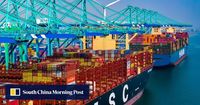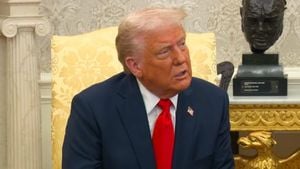As the trade war between the United States and China escalates, Beijing has taken a significant step by suspending the export of several critical rare earth elements, metals, and magnets. This move threatens to choke off supplies to the West of components essential for a wide range of industries, including weapons, electronics, automotive, aerospace, and semiconductor sectors. The New York Times reported that shipments of magnets, which are crucial for manufacturing everything from cars to missiles, have been halted at many Chinese ports.
The Chinese government is currently drafting a new regulatory system for exports, and while these policies are being framed, the suspension of exports could permanently prevent supplies from reaching certain companies, particularly American military contractors. According to estimates, China produces around 90 percent of the world's rare earths, a group of 17 elements used across various industries, including defense, electric vehicles, energy, and consumer electronics.
On April 2, 2025, Beijing placed export restrictions on rare earth elements as part of a broader package of tariffs and company restrictions in retaliation for President Trump’s decision to hike tariffs against most Chinese products to a staggering 54 percent. The export curbs include not only mined minerals but also permanent magnets and other finished products that will be difficult to replace, analysts warn.
Now, metals and special magnets made with these rare earths can only be shipped out of China with special export licenses. However, the system to issue these licenses is still in its infancy, leading to concerns among industry executives that the process could take time and that current supplies of minerals and products outside of China could dwindle. The move affects exports to all countries, not just the U.S., and further demonstrates China's ability to leverage its dominance over the mining and processing of critical minerals.
Lockheed Martin, Tesla, and Apple are among the U.S. companies that rely on Chinese rare earths in their supply chains. While the U.S. government has stockpiles of some rare earths, they are insufficient to sustain defense contractors in the long term. Beijing has already imposed outright bans on the export of three metals to the U.S. and has slapped export controls on many others. David Merriman of consultancy Project Blue noted that the heavy rare earth metals under suspension are particularly important as China maintains tight control over these elements.
These heavy rare earth metals are used in magnets essential for various electric motors found in electric vehicles, drones, robots, missiles, and spacecraft. They are also required for manufacturing jet engines, lasers, car headlights, and certain spark plugs and capacitors, which are vital components of the computer chips powering artificial intelligence servers and smartphones.
In parallel to the export suspensions, China’s export figures showed resilience in March 2025, with outbound merchandise shipments rising by 12.4 percent year-on-year to $313.9 billion. This increase was significantly above market forecasts and marked the fastest growth since last October, indicating a rush to ship goods before the full impact of U.S. tariffs took effect in April. Imports, however, sank by 4.3 percent year-on-year in March following an 8.4 percent decline in the first two months of the year, resulting in a trade surplus of $102.64 billion for March.
President Trump has threatened to impose new tariffs of 145 percent on Chinese goods, which, when combined with existing tariffs, would push the effective tariff rate to an unprecedented 156 percent. The uncertainty surrounding these tariffs has scrambled prospects for many global businesses, and U.S. retailers are now weighing whether to raise prices or absorb the additional costs.
As the trade war intensifies, the U.S. administration has been waiting for Chinese leader Xi Jinping to reach out to Trump, but Beijing appears cautious about placing Xi in a volatile situation with the U.S. president. In a related diplomatic move, Xi is set to arrive in Vietnam on April 14, 2025, as part of a weeklong tour that will also take him to Malaysia and Cambodia. During this visit, he is expected to oversee the signing of around 40 agreements, including loans for a $8.3 billion railway project connecting northern Vietnam with China.
As the global market watches closely, the ramifications of this trade conflict continue to unfold. With both nations heavily intertwined in economic ties, the suspension of rare earth exports by China is likely to have far-reaching consequences for industries reliant on these critical materials, and it underscores the fragile state of U.S.-China relations.
In summary, the suspension of rare earth exports by China amid rising trade tensions with the U.S. poses a significant threat to various industries, particularly those dependent on these essential materials. As both countries navigate this complex landscape, the future of their economic relationship remains uncertain.







